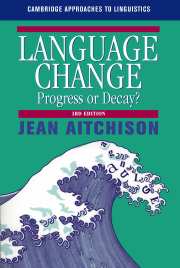Book contents
- Frontmatter
- Contents
- Preface
- Part 1 Preliminaries
- Part 2 Transition
- 4 Spreading the word
- 5 Conflicting loyalties
- 6 Catching on and taking off
- 7 Caught in the web
- 8 The wheels of language
- 9 Spinning away
- Part 3 Causation
- Part 4 Beginnings and endings
- Symbols and technical terms
- Notes and suggestions for further reading
- References
- Acknowledgments
- Index
9 - Spinning away
Change of meaning
from Part 2 - Transition
- Frontmatter
- Contents
- Preface
- Part 1 Preliminaries
- Part 2 Transition
- 4 Spreading the word
- 5 Conflicting loyalties
- 6 Catching on and taking off
- 7 Caught in the web
- 8 The wheels of language
- 9 Spinning away
- Part 3 Causation
- Part 4 Beginnings and endings
- Symbols and technical terms
- Notes and suggestions for further reading
- References
- Acknowledgments
- Index
Summary
Words can have no single fixed meaning. Like wayward electrons, they can spin away from their initial orbit and enter a wider magnetic field. No one owns them or has a proprietary right to dictate how they will be used.
David Lehman, Signs of the Times‘When I use a word … it means just what I choose it to mean – neither more nor less.’ This comment by Humpty Dumpty in Lewis Carroll's Through the Looking-Glass (1872) confirmed to nineteenth-century readers that Humpty Dumpty lived in a strange, back-to-front world: at that time, most people were convinced that words had a ‘proper’ meaning which needed to be preserved.
Fears about meaning slippage recur throughout history. In the fifth century BC, the Greek historian Thucydides linked changes in meaning with a decline in moral values, caused by the despiriting effect of war, a time when: ‘The ordinary accepted meaning of words in their relation to things was changed as men thought fit.’
These anxieties reached their height in the nineteenth century. Slipped words ‘bear the slime on them of the serpent's trail’, according to Richard Chenevix Trench, the influential nineteenth-century figure who later became Archbishop of Dublin. Meaning change was a falling away from the original standard which God had imposed, he assumed. He deplored those from whom words ‘received their deflection and were warped from their original rectitude’.
- Type
- Chapter
- Information
- Language ChangeProgress or Decay?, pp. 120 - 130Publisher: Cambridge University PressPrint publication year: 2000

